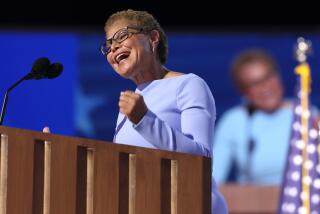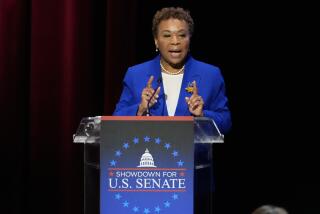Karen Bass: Madame Speaker
Since California added term limits to the political rule book in 1990, the piece of furniture occupied by the speaker of the California Assembly has become both a musical chair and an ejector seat. We’ve had nine speakers in 14 years. Karen Bass is the latest, a Los Angeles Democrat and the first black woman in the job. She was elected to the Assembly in 2004. She became speaker a year ago, and she’ll have to pack up and be gone next year. When I first met her, she was a physician’s assistant and a community organizer, crusading for foster care and against the myriad liquor stores in South Los Angeles. Sure, today she sits next to the governor in the “big five” meetings -- but with the ticking clock of term limits and the most hellacious budget in decades, I think of the speaker’s job now as much like the Woody Allen joke about two women chatting at a resort: “The food here is so awful.” “Yes, and such small portions.” Bass dishes it out, and takes it.
Correction: The year of the car accident that took the life of California Assembly Speaker Karen Bass’ daughter was incorrect in the June 27 Patt Morrison Asks. The accident occurred in 2006, not 2008.
You studied martial arts?
When I was in my early 20s, I studied tae kwon do and hapkido. I earned brown belts in both of them. What it taught me was how to fight in a manner that is respectful; don’t personalize, and get to the point. The goal of a martial artist is actually to not fight, [it’s] to prevent the fight. If somebody attacks you, you’re taught how to take their energy and use it against them. Remember those old Bruce Lee movies? When somebody who had watched a Bruce Lee movie would think they knew how to fight -- with no discipline, no control -- they would come in just flailing, swinging. You should have goals; it should be clear where the beginning, middle and end game is, and that’s what I felt I was taught.
How has that helped in the speaker’s job?
The discipline, the control of emotions and picking your fights -- not just fighting because it makes you feel good, but fighting with a purpose.
What do most Californians misunderstand about the mess that we’re in now?
I think we have a state where people want a particular quality of life, but they don’t necessarily want to pay for it. They want you to pay for it. [laughs] So: “Cut, but keep my parks open.”
California is one of three states that [require] a two-thirds vote to pass a budget. That causes paralysis. I don’t think people realize that the Legislature only has control over 10% of the budget, and that the people contributed to gridlock through the initiative process. People don’t realize that we have a tax system that is outdated. People don’t realize that it’s not a matter of the deficiency of individuals [in Sacramento]. In some ways it’s not even a matter of partisanship.
How do you think conservative talk radio has affected the Legislature’s work?
The Republicans were essentially threatened and terrorized against voting for revenue. Now [some] are facing recalls. They operate under a terrorist threat: “You vote for revenue and your career is over.” I don’t know why we allow that kind of terrorism to exist. I guess it’s about free speech, but it’s extremely unfair.
Do you get especially exasperated when your own people -- Democrats -- don’t agree with you?
You know, I was a community activist, so I’m used to standing out in front of an elected official’s office and protesting. It’s only been five years since I’ve been on the other side. I get frustrated when we’re in the middle of the deepest recession since the Depression and people say, “You really shouldn’t cut.” This is very, very painful. I’m doing the exact opposite of what I ran for office for. But I do have to be an adult in this situation. My job is to protect [programs], but I can’t be unrealistic and say, “We’re not going to cut.”
Some people on both sides say that we have to destroy state government in order to save it.
That’s definitely a school of thought: Let the state fall and then we’ll be able to convince the Republicans to vote for revenue. And some Republicans say, “Let the state fall and then we’ll be able to shrink government.” If we let government run off a cliff, what about the people who die in the process? I believe people are already feeling the pain. Do people need to see people dying? I’m not sure. I don’t subscribe to the school of thought that says, “They voted down the initiatives, let’s give ‘em what they want” [i.e. a meltdown]. I think what voters said was, “We’re sick of this, you solve it.” I don’t think voters said, “We want you to shut down schools and clinics.”
What’s our way out?
I do think that some fundamental reforms need to take place. I would be concerned about a constitutional convention, only because, as I understand it, if you open that door up, all kinds of things can be put on the agenda, like [abortion rights]. While we’re trying to solve this budget crisis, we are also figuring out how to launch reforms that would address some of it. Things like the initiative process -- that was a wonderful idea 50 years ago. I think it needs to be changed. I don’t think you should put an initiative on the ballot without bringing a funding source. We should be able to pass a budget [without] a supermajority. If it’s not 51%, maybe 55% or even 60%. We should be able to raise revenue -- local communities should be able to raise revenue on their own. We need to modernize the tax system.
What happens between now and July 1?
I feel very proud of the plan [the Democrats] put forward. If it weren’t for the Republicans who blocked the bill in the Senate, we would already have cash solutions on the governor’s desk. It looks like there are people who are looking to hijack the crisis to use it as an excuse to eliminate the safety net and gut public schools. Democrats are continuing to work to prevent that.
You volunteered for Bobby Kennedy when you were 14. Why?
What totally captured me, before I was 14, was the civil rights movement. My father was from the South and turned me into a news junkie at a very early age. I would sit and watch TV with him. It seemed like the whole world was changing. I couldn’t wait to grow up.
So many people in politics get cynical about it all, that it’s cut and dried, a done deal.
The moment I feel that way, I quit.
How do men and women deal with power differently?
I think that women are much more collaborative; men are much more competitive. And here’s the funny thing: I think men are more emotional. I don’t know where we got the “hysterical” rap.
How does this manifest itself?
In terms of competition, a lot of the negotiation between members -- the conflicts. A lot of it is over territory. The emotion is typically anger, and anger displayed in an explosive manner.
As an African American woman, are you able to do things a white man would not be able to?
No, I think it’s a lot easier for white men, absolutely. I feel that gender is much more of a dynamic [in the Legislature] than race is. It’s just overwhelmingly male -- in every sector of life in Sacramento. It doesn’t bother me because I’ve grown up with that. But sometimes it’s a little taxing. At press conferences, I go out of my way and call on the women [reporters] because if I don’t, they will not be heard. I just think that the guys are overpowering. It’s not overt; it’s not like they make overtly sexist comments. It’s just people going about life. If you’re the overwhelming majority, you function that way.
What do you make of the anger in the gay community about African Americans and Proposition 8 -- and vice versa? When gays talk about marriage as civil rights, some African Americans say, “Whoa, don’t go there.”
Trying to say, “What you went through is the same thing we’re going through” -- that’s what African Americans have a hard time with. Race -- you can’t really mistake who I am. I most certainly didn’t support Proposition 8. Every time marriage equality has come up, I’ve voted for it. I’ve contributed financially. [But] if you look at people’s struggles, you have to respect them for their uniqueness. You can’t say they’re all the same. And I also think, within the general generic gay community, they need to lift up the black gay community. I know that black gays and lesbians [have] felt very disrespected.
You lost your only child, your daughter, Emelia, and her husband, Michael Wright, in a car crash in October 2008. You still wear her wedding ring and her locket. How has losing her changed you?
My daughter was the center of my life, and it has changed me forever. The only way I can describe it is if you use an analogy of physical pain. It’s like having a deep wound that never heals. Over time, you learn how to manage the pain [but] it doesn’t go away. My life is intense and consumed, but I go home at night, and I wake up in the morning, [and] she is on my mind constantly. The good news is that I’m very close to all of her closest friends. I was like the play-mom. When [Emelia] was in college, she’d come home and say, “Well, you don’t mind if so-and-so stays with us for three months?” There were a couple of summers when I was running a sorority.
Do you ever smoke in the tent with the governor? Does he give you a ride home in his jet?
I don’t smoke. I feel I have a fine relationship with the governor. There’s a lot of things we agree about and certainly a lot of things we disagree about. You hear about the partisan divide a lot, and it’s true, it’s there, but most of it is not really personal. Even my most conservative Republican colleagues -- we’re not angry at each other, we just realize we come from different planets! And yes, he’s given me a ride home in his plane.
patt.morrison@latimes.com.
This interview was edited and excerpted from a longer taped transcript. Interview archive: latimes.com/pattasks.More to Read
Sign up for Essential California
The most important California stories and recommendations in your inbox every morning.
You may occasionally receive promotional content from the Los Angeles Times.











